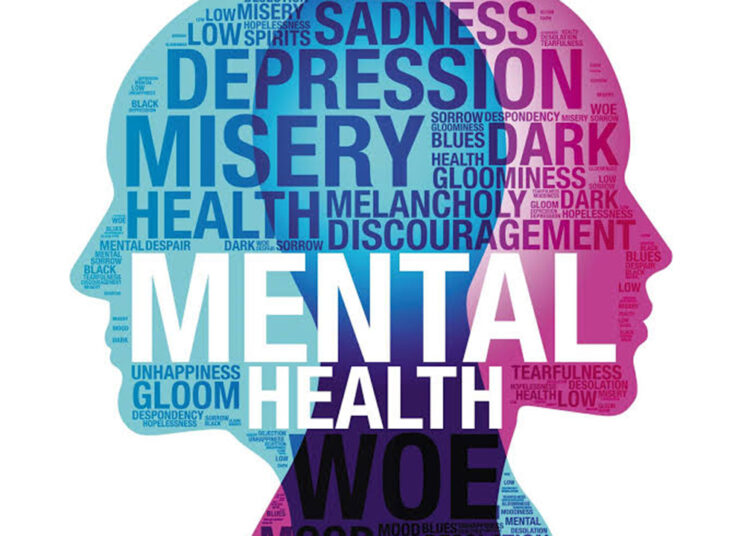As the world commemorates World Mental Health Day, experts in Nigeria have expressed concern over the country’s deepening mental health crisis, citing an extreme shortage of psychiatrists and other mental health professionals amid growing socioeconomic challenges.
An associate professor of Psychiatry at the College of Medicine, University of Lagos, and Consultant Clinical Psychologist at the Lagos University Teaching Hospital (LUTH), Dr. Charles Umeh, warned that the country may face a full-blown mental health crisis if urgent action is not taken to address the growing burden of mental illness, rising substance abuse, and the acute shortage of mental health professionals.
In an exclusive interview with our correspondent, Dr Umeh identified genetics, environmental factors, and trauma, particularly childhood trauma and domestic violence, as primary triggers for mental illness.
“Some people are genetically predisposed to mental illness, especially conditions like schizophrenia, which can begin to manifest in adolescence or early adulthood. However, having a genetic predisposition doesn’t guarantee mental illness; it depends on how well individuals manage their environment and stressors,” he explained.
He added that trauma, whether from childhood abuse, domestic violence, or other distressing experiences, can leave long-term scars that lead to mental health breakdowns later in life.
“People who experience sexual abuse and are told to keep quiet about it often grow up as prisoners of conscience. When their defences break down, they manifest symptoms,” he said.
According to Dr Umeh, mental health challenges exist on a continuum, meaning everyone experiences some level of mental distress due to life’s pressures.
“Virtually everyone goes through mental health issues daily; the difference is in coping capacity.
The key focus now should be helping people develop coping skills to prevent breakdowns,” he noted.
The World Health Organisation (WHO) defines mental health as a state of well-being that enables individuals to cope with life’s stresses, work productively, and contribute to their communities. WHO emphasised that mental health is more than the absence of disorders and exists on a continuum that varies from person to person.
This year’s World Mental Health Day, themed “Access to Services – Mental Health in Catastrophes and Emergencies”, underscores the need to provide psychosocial support to individuals affected by crises such as conflict, natural disasters, and economic instability.
However, according to the Association of Psychiatrists in Nigeria (APN), Nigeria has fewer than 200 psychiatrists. This figure translates to one psychiatrist per million people, far below the World Health Organisation (WHO)’s recommendation of one per 10,000.
Further findings by LEADERSHIP revealed that most available psychiatrists and clinical psychologists are concentrated in urban centres, leaving rural communities severely underserved. Many primary healthcare facilities across the country lack basic mental health services, forcing millions of Nigerians to suffer in silence or seek help from untrained individuals.
Dr Umeh warned that the situation worsens due to poor recognition and brain drain. “Nigeria has possibly even fewer than 500 psychiatrists serving over 200 million people. Clinical psychologists, who are key in handling mild to moderate cases before they escalate, are not adequately recognised or employed,” he said.
He revealed that many trained clinical psychologists leave the country because they are underpaid or excluded from the civil service structure. “Until recently, psychology wasn’t even captured in the civil service scheme. Many interns I trained have left Nigeria because they are not valued,” he noted.
Dr Umeh identified stigma and cultural misconceptions as significant barriers preventing Nigerians from seeking professional help.
“When people first notice symptoms, they often run to churches or traditional homes. They only turn to hospitals when the situation has become severe. We need to tell people they can pray and still seek professional help,” he said.
He called on the media, religious institutions, and traditional leaders to play greater roles in promoting mental health awareness and debunking myths.
The clinical psychologist also expressed deep concern over the increasing use of psychoactive substances, especially among youths, warning that early exposure could worsen the country’s mental health burden.
“Many secondary and even primary school students are already experimenting with drugs. Substance use is becoming widespread, cutting across rural and urban areas. You can smell cannabis on almost any street,” he revealed.
He cautioned that if the trend continues, Nigeria could face an epidemic of mental health disorders driven by substance abuse.
Dr Umeh urged the government to take a more intentional approach by investing in mental health infrastructure, creating jobs for trained experts, and integrating mental health services into primary healthcare.
“This is not something to pay lip service to. Government must engage experts, involve parents, and strengthen family values because prevention starts from home,” he said.
LEADERSHIP recalls that Nigeria made a notable policy stride in January 2023 with the signing of the Mental Health Act, replacing the 65-year-old Lunacy Act. The law decriminalises suicide attempts, safeguards the rights of people with mental health conditions, and calls for the integration of mental health services into primary healthcare.
However, implementation has been slow. Experts said that despite the law’s promise, integration of services remains largely “on paper,” with limited real-world impact.
The President of APN, Prof. Taiwo Obindo, expressed concern over the continued decline in the number of mental health practitioners due to brain drain.
“The training colleges have established that out of every five specialists trained, three leave within a year of completing their program. The number of psychiatrists, clinical psychologists, social workers, and psychiatric nurses is dwindling. Many have retired, and the few remaining are overstretched,” he lamented.
To tackle the crisis, mental health experts urged increased investment in mental health education, workforce retention, and infrastructure, especially at the primary healthcare level.
Prof. Obindo, a Professor of Psychiatry at the University of Jos, stressed the importance of decentralising mental health care.
“If mental health services are integrated into primary healthcare, more Nigerians, especially those in rural areas, will have access to the care they need,” he said.





